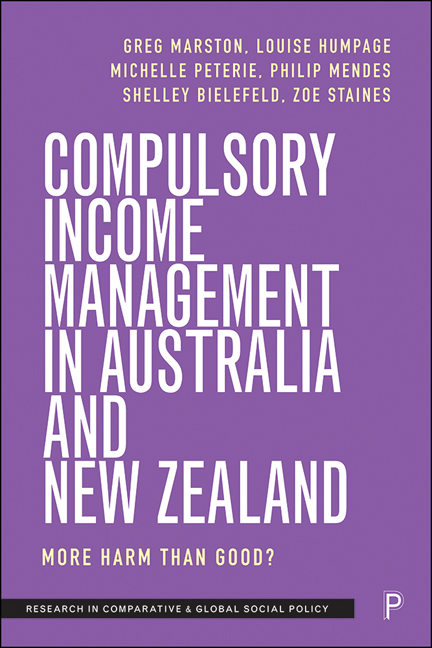Book contents
- Frontmatter
- Contents
- List of abbreviations
- About the authors
- Acknowledgements
- Series preface
- 1 Framing welfare conditionality
- 2 Why Income Management?
- 3 Barriers to implementing Compulsory Income Management
- 4 Identity and emotion
- 5 Procedural, consumer and contractual rights, and access to justice
- 6 Resistance and reform: individual and collective agency
- 7 Voluntary Income Management and financial education
- 8 Recalibrating social security and reimagining work
- References
- Index
4 - Identity and emotion
Published online by Cambridge University Press: 08 October 2022
- Frontmatter
- Contents
- List of abbreviations
- About the authors
- Acknowledgements
- Series preface
- 1 Framing welfare conditionality
- 2 Why Income Management?
- 3 Barriers to implementing Compulsory Income Management
- 4 Identity and emotion
- 5 Procedural, consumer and contractual rights, and access to justice
- 6 Resistance and reform: individual and collective agency
- 7 Voluntary Income Management and financial education
- 8 Recalibrating social security and reimagining work
- References
- Index
Summary
‘Usually people think that you’ve done something wrong to warrant it. I don't think people look at you positively for being on welfare. There's so much propaganda and stereotypes around. … I don't think people would see my card and think, “She's done a university degree, she worked, she's tried hard”. I don't think so. They would look at the Indue card and … just assume I don't want to work or I’m on drugs, or they would just assume bad things that aren't really true.’ (Tahlia, Hinkler)
Introduction
CIM has been touted as a measure to bring financial stability to welfare recipients’ lives, improving the health and wellbeing of individuals and communities in the process. In reality, however, CIM can have contradictory and even counterproductive effects. As the previous chapter showed, CIM introduces new financial pressure into many participants’ lives. This is particularly true in Australia, where welfare recipients in (CDC) trial sites have struggled to make basic purchases and pay essential bills. Building on this picture of financial difficulty and deprivation, this chapter explores the impact of CIM on participants’ wellbeing and sense of self. It shows that while financial stress and reduced financial control are key concerns for many participants, the infantilisation and stigmatisation that CIM involves are also powerful stressors. Together, these factors can contribute to significant reductions in participant wellbeing, harming cardholders, their families and their communities.
This chapter has five parts. First, key insights regarding the influence of financial deprivation on physical and psychological wellbeing are reviewed, underlining the importance of available funds, personal autonomy and social connectedness for good health. Second, it is shown how CIM infantilises and disempowers participants. Third, participant experiences of social stigma are explored, underlining the role of public discourses in shaping these experiences. Fourth, it is revealed that (as the extant scholarship would predict) this combination of financial deprivation, infantilisation and stigmatisation has profound negative impacts, corroding participants’ social and emotional wellbeing and inflicting radiating harms. The chapter concludes that – while a minority of individuals experience improved financial and material stability under CIM – the social and emotional impacts of the policy have been largely negative.
- Type
- Chapter
- Information
- Compulsory Income Management in Australia and New ZealandMore Harm than Good?, pp. 74 - 100Publisher: Bristol University PressPrint publication year: 2022



